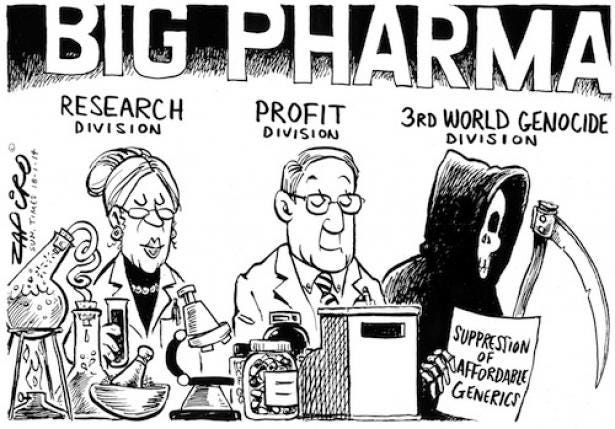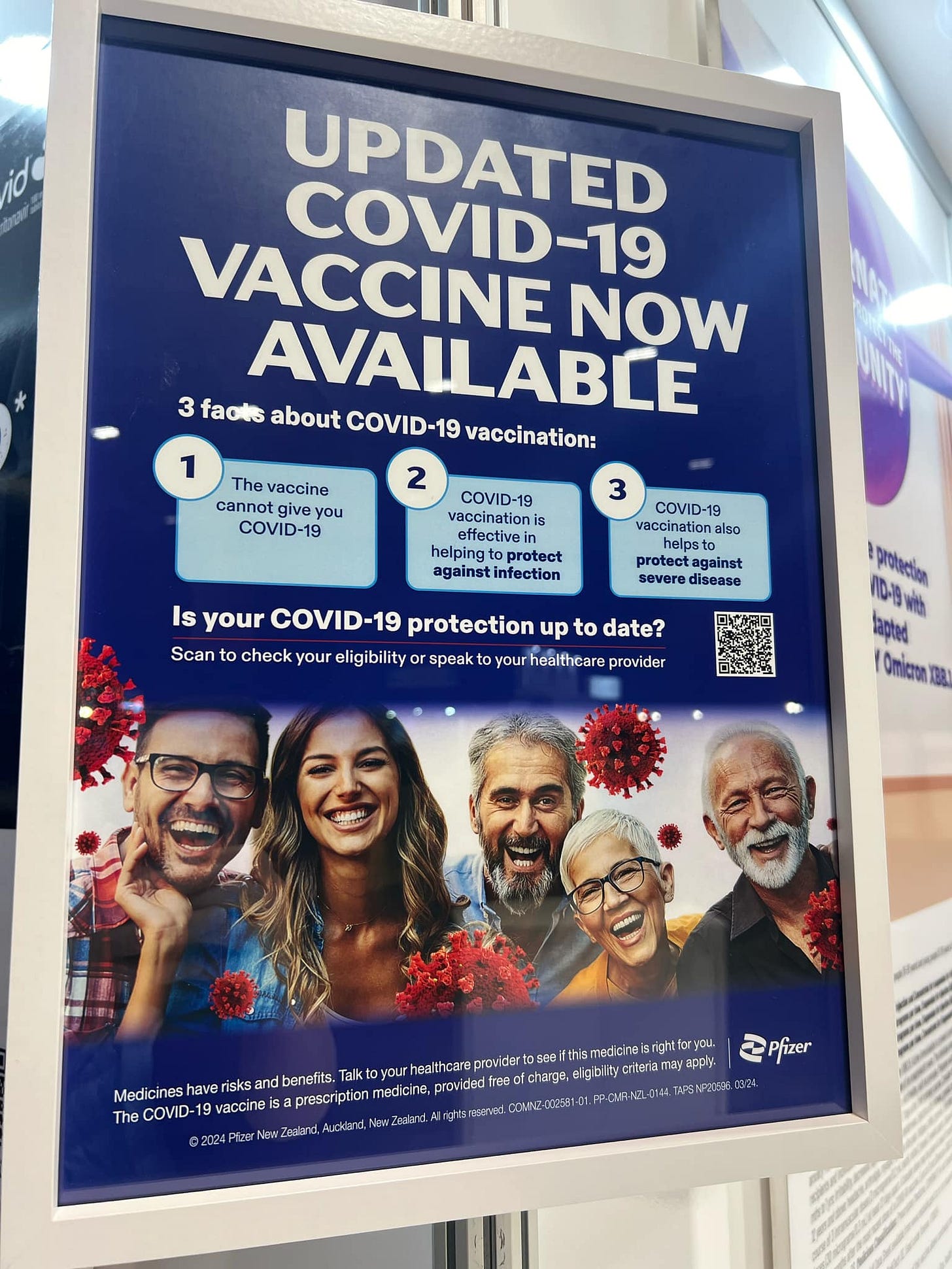Putting Profit Over Health
Contributor On The Decline Of True Healthcare Due To Big Pharma's Insatiable Greed
As a health practitioner and science writer living through my own awakening of the Mafia-style protection racket now embedded in our health systems, I loved listening to Ron Piana’s intriguing account of pharmaceutical industry corruption. An articulate storyteller with a rugged Long Island accent, he was obviously recruited to a career in writing because of his natural skill with words.
“What I’m about to talk about, later on in the story, challenges a $200 billion cancer industry. And anytime you challenge that type of power structure, there’s blowback. They will try to discredit me but they can’t because I’m an insider. I’m one of them.”
What I didn’t know when I began listening to Ron, was that our stories cross paths in more ways than one, sharing interest in a biopharmaceutical company based in Ron’s hometown of New York City.
On a train trip between Philadelphia and New York in 2008, I met a Manhattan local returning home from a philanthropy conference. He was a microbiologist at a biopharmaceutical company which financially boomed when the infamously controversial drug Thalidomide was discovered as a treatment for certain conditions including leprosy and some cancers. Having worked with leprosy patients, we had an immediate common interest and became friends.
A few years later, I spent a year working on a tuberculosis program in South East Asia, where I became extremely familiar with the horrors of poverty caused by war and corrupt systems. One of the worst scenarios I encountered was a 26yo woman who had travelled from her rural village to the city seeking treatment for unexplained, chronic abdominal pain. She was eventually diagnosed with cancer and her family went into inter-generational debt, her father and brother moving away to work in order to start paying off the costs of the surgery they were told she needed.
As described by an American surgeon some years later, she was “butchered” on the operating table and ended up with two large open wounds which constantly oozed faeces onto the skin of her abdomen. She was unable to absorb nutrients and became severely malnourished.
Bankrupted and unable to afford further treatment, which likely would have caused further harm anyway, she was sent home to die. There were no affordable medical supplies so she spent her days lying flat, trying to keep the offensive, thick brown discharge from burning her skin with cool wet cloths.
Some months after the surgical injury occurred, she developed a cough and tested positive to drug resistant tuberculosis. I met her upon admission to our tuberculosis program, aged 26 years and weighing 22kg. The tuberculosis drugs cured her cough and also cured her abdominal pain, which was likely, as it turned out, caused by mesenteric tuberculosis, incorrectly diagnosed as cancer, which is an easy error to make.
Despite the cure of her tuberculosis, the surgical wound kept her bed bound, malnourished and dealing with the constant offensive discharge. Her life was spent on a mattress in a bamboo walled village house, unable to move more than a few metres without needing to be carried.
About a year after meeting her, I was traveling in Europe at the same time my New York friend was visiting rural France, and he invited me to join him. One sunny midsummer afternoon I found myself lunching under a grapevine overlooking an ancient castle across a valley of vineyards with a group of wealthy Americans.
In the course of our conversation one of them asked me about my time in Asia. When I stated that I’d seen a lot of poverty she asked me to elaborate. There were many examples I could have given, but I used the story of this patient to describe the suffering that happens to people who have no rights, no money, no opportunity and no access to decent education or health care.
After questioning me at length, our lunch companion announced that her husband was a leading gastroenterology surgeon in the USA, “and he could cure her". An impossibility, I listed all of the roadblocks to her, but she refused to accept any of them. My wealthy friend joined in on the idea, offering to pay all additional costs if the American hospital would cover the surgery and recovery costs. A few months later, I was flying to the USA with the patient, her mother and a local nurse as translator. She had successful corrective surgery in a tertiary hospital at no cost and is now living a normal, albeit impoverished life, in her village again.
None of this would have happened had I not been connected to a beneficiary of the pharmaceutical industry. The ultra wealthy have immense capacity to relieve suffering of those existing in deprivation.
Yet, rather than helping to lift people out of poverty, Ron Piana describes articulately, the harm-for-profit practices embedded in the pharmaceutical industry. After spending his early life as a barman and seafarer, experiencing some hair-raising adventures across the USA and South America, he started his writing career as a proof reader before rising through the ranks and ultimately becoming a freelance writer, specifically for high impact oncology journals.
He recalls enjoying the benefits of life as a writer until the overwhelming amounts of money involved in drug company marketing, presenting itself dishonestly as scientific evidence, began to unsettle him. He observed doctors being paid consulting fees to promote drugs with no effectiveness and multiple serious adverse events. In a crisis of bioethics, it is also known that many journal articles are ghost-written by authors representing industry.
I recently attended the annual New Zealand General Practitioner Conference and Medical Exhibition (GPCME) in Christchurch, where I observed a lot of the same things that Piana describes. Unsurprisingly, the most extravagant poster exhibition was Pfizer, with a raised floor, lockable cupboards and glimmering, dishonest advertisements posing as The ScienceTM.
All of the conference presentations were intensely focused on pharmaceutical products. One presenter used a headline about babies dying of pertussis (whooping cough) “because those around them were not vaccinated” to promote the importance of pertussis vaccination in parents and other carers of newborns, known as the “cocoon strategy”. In fact, there is no evidence to support the use of this strategy.
When asked to provide clinical detail relating to these pertussis deaths, such as gestation at birth, medical background and breastfeeding status, the presenter stated that such details were unknown. Many factors place babies at risk of specific diseases, and a generalised claim blaming “those around them” has no basis in evidence whilst important clinical details are missing which may explain the real cause.
This supports Piana’s examples of medical professionals relying on information from industry marketing rather than robust medical science.
Published last month, Piana’s interview with filmmaker Mark Laita of Soft White Underbelly is a provocative inventory of the psychopathic entity which has overtaken our health systems, from the World Health Organization in Geneva, to national health systems including here in New Zealand.
Our doctors, nurses, allied health workers, medical writers, medical journals and administrators must demand a return to quality health care with a focus on robust and honest scientific processes, ethical practices and population health needs.
If we allow our health system to continue to deteriorate in the name of profit over health care, then we can expect a deterioration in standards to those experienced in poor nations.
Please share this video.
If you are a concerned citizen, doctor or health professional wondering how you can help to change the dangerous trajectory that we are on, read The Hope Accord and add your signature.











Let’s hope RFK gets the opportunity to take Pharma on after the U.S. election. There needs to be a monumental reset - the entire edifice has to be torn down and a new, very different edifice erected.
FELICES Y GRACIAS